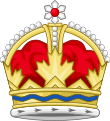  | |
| United Nations membership | |
|---|---|
| Membership | Full member |
| Since | November 9, 1945 |
| UNSC seat | Non-permanent |
| Permanent Representative | Bob Rae |
 |
|---|
Canada was a founding member of the United Nations, and was an original signatory of the Declaration by United Nations. At the signing of the Declaration by United Nations, Canada was one of four Dominions of the British Empire present, alongside Australia, New Zealand, and the Union of South Africa. In 1945, Canada was present at the United Nations Conference on International Organization and signed the Charter of the United Nations. McGill University professor John Peters Humphrey was the principal author of the first draft of the Universal Declaration of Human Rights.
Canada has served on the United Nations Security Council (UNSC) as a non-permanent member 8 times, with the most recent being in 2000. For its first 2 terms in the UNSC, Canada took the Commonwealth seat on the council, but since 1967, Canada has run for the Western European and Others Group seat. Canada is a member of Uniting for Consensus, a group that opposes the G4 nations' bids for permanent seats on the Security Council.
During the Suez Crisis, Canadian delegation to the United Nations was instrumental in the creation of the United Nations Emergency Force (UNEF) to end the situation. In 1957, then-Secretary of State for External Affairs Lester B. Pearson was awarded the Nobel Peace Prize for his role in the creation of the UNEF.[1]
- ^ "The Nobel Peace Prize 1957". www.nobelprize.org. The Nobel Prize. Retrieved 17 May 2021.
